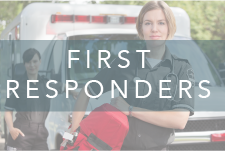The Invisible Battle: Firefighters and Mental Health
- Austin Pederson
- Feb 11, 2022
- 6 min read
Updated: Feb 14, 2022
It's no secret that firefighters put their lives on the line every day. But what is often overlooked is the toll that this work takes on their mental health. Between 24 hour shifts and endless calls, countless firefighters develop conditions like post-traumatic stress disorder, acute stress disorder, anxiety, depression, and suicidal ideation.

A recent study found that firefighter suicide rates are more than 2x the national average. This is a serious problem that deserves attention. In this blog post, we will explore the invisible battle that firefighters face when it comes to mental health. First, we will investigate the mental health challenges that firefighters face. Then, we'll look at how First Responder Wellness Center is working to treat these conditions among first responders.
The Mental Health Challenges that Firefighters Face
Firefighters are constantly exposed to dangerous situations and traumatic events. This can take a toll on their mental health. Some of the most common mental health challenges that firefighters face include:
Post Traumatic Stress (PTS)
Commonly known as PTSD or PTSI is a condition that develops after exposure to a traumatic event. Symptoms include flashbacks, nightmares, avoidance of reminders of the trauma, and emotional numbness.
Acute Stress Disorder (ASD)
Acute stress disorder is a similar condition that develops in response to a traumatic event. Symptoms usually appear within one month of exposure and may last for up to three months. Some common symptoms are persistent reexperiencing of the trauma, dissociation, and arousal.
Anxiety
For many firefighters, work is hectic and unpredictable — you never know what will happen next. This can cause high levels of anxiety for first responders who are constantly on the go.
Depression
First responders are at an increased risk of depression due to their stressful job duties. A recent study found that firefighter suicide rates are more than twice the national average.
Suicidal Ideation
First responders who struggle with depression may develop suicidal ideation. This means that they start to think about suicide. These thoughts may lead to harmful or detrimental behaviors that may show up in the workplace, or at home.
Why First Responders Struggle with Mental Health
It's no secret that firefighters, police officers, and emergency medical technicians (EMTs) put their lives on the line every day. They face dangerous situations and traumatic events that can take a toll on their mental health.
The culture in first responders is to not talk about your feelings or emotions. Years of trauma build-up to issues like depression anxiety and alcohol abuse. First Responders often feel like they have to be strong for everyone else and don't have time for themselves.This leads to many first responders hiding their struggles from friends and family members. They feel ashamed or embarrassed that they can't handle things the way others seem to be able to. But first responders need to know they aren't alone. First responder mental health issues are incredibly common, and there's nothing wrong with asking for help when you need it.

First responder services have been created specifically as resources to address this problem - because many first responders don't realize they're not supposed to be handling everything on their own!
We understand that firefighters face unique challenges in the workplace; they aim at providing support through peer-to-peer mentoring programs designed specifically by First Responders themselves. In addition, our website offers information about medical treatment options available from licensed doctors who specialize in treating PTSD.
It is important for those affected by trauma whether directly or indirectly to be proactive in seeking the necessary medical care. First responders are not immune from developing PTSD and as such should take all steps possible to seek diagnosis and treatment for this debilitating disorder.
If you're a first responder who's been struggling with your mental health, please know that you're not alone. Some people want to help you, and there are resources available to you.
Injuries that Occur on the Job
It is common for injuries to occur on the job. It is estimated that almost three million people are injured every year. While many of these injuries are physical, there are also mental health implications that can arise from an injury. Feelings of depression or substance abuse can increase after an injury. This makes rehabbing and healing more difficult. We must provide support for our firefighters as they go through this process.
Common injuries that affect firefighters regularly.
Lacerations, Abrasions, and Superficial Wounds
These kinds of wounds can occur for any number of reasons with firefighters. The physical nature of the job means there is always the potential for these types of wounds to occur. Firefighters often have scraped from climbing ladders or getting in and out of their gear or vehicle. Burns is also possible when working around heat sources like intense flames and smoke inhalation is something all fighters deal with as well because it comes hand in hand with smoke exposure during fires.
Broken Bones and Fractures
Due to the nature of the job, broken bones are another common injuries for firefighters. While they do everything they can to prevent this type of injury by wearing proper protective gear and following safety protocols, it is still possible for them to get hurt while working as a firefighter which includes getting injured with falls during rescues or being hit/run over by an object at fireside (not every fire alarm goes off at home). Firefighters also suffer from fractures due to smoke inhalation because when your lungs fill up fulls with soot, it can make breathing difficult which may lead to broken ribs.
Broken bones can often be rehabbed with physical therapy and rest. If the injury is severe enough that surgery needs to take place then rehab will also include some form of rehabbing your body back into shape before you're ready for work again which could take months depending on how bad their injury was but even if they are off duty from being a firefighter full time until recovery, there are still other jobs at fire stations where firefighters can stay connected with their teams while recovering.
Spinal Injuries
Firefighters have been known to suffer spinal injuries due to falls or heavy lifting during fireside. These injuries can occur for any number of reasons and range
When rehabbing first responders who have suffered injuries, it is important to focus on recovery time. Depending on the severity of their injuries, rehab may take anywhere from a few days to weeks or even months in some cases where there is extensive damage that needs repairing.
Dual Diagnosis For Firefighters
As we all know, there are many serious health issues affecting firefighters and they are able to get appropriate treatment. However, a particular issue that is not commonly addressed is the dual diagnosis of post-traumatic stress disorder or PTSD along with alcohol dependence. The two conditions are interconnected because alcoholism often develops in response to trauma. As such, firefighting must be considered as a high-risk occupation for both PTSD and alcohol abuse since it involves routinely dealing with traumatic events on the job.
As much as 24% of firefighters have been reported to exhibit symptoms of depression at some point during their career. Firefighters’ natural tendency to repress emotions can be detrimental when combined with repeated exposure to traumatic incidents over time. In fact, nearly 50% of firefighters with PTSD also have an alcohol use disorder. This is the most common dual diagnosis outcome after years of alcohol use and traumatic events.
There are a few reasons why this problem may be particularly severe among firefighters. One reason is that they often do not seek help for fear of being seen as weak or incapable. Additionally, there can be a strong culture of silence around mental health issues in the fire service. Many firefighters feel like they need to be tough and self-sufficient, so admitting that they need help can be difficult. Another obstacle to getting treatment is the lack of available resources specifically for firefighters with PTSD and alcohol dependence. These individuals often require specialized care that is not always easy to find. However, it is crucial that these issues are addressed in order to improve the quality of life for firefighters and their families.
Where can firefighters seek the help they need?
There are many places first responders can turn for help. There are specific treatment centers designed to deal with the unique challenges of first responder mental health. First responder rehab facilities are also available, and it can be very beneficial to get back on track. Peer support is another great option; firefighters often have access to resources that can help them in their time of need. No matter what path you choose, don't hesitate to ask for help when you need it. You're not alone in this fight.
The culture is slowly changing when it comes to first responder mental health. We are starting to see more and more people talking about the issue, and that's a good thing. It means we're moving in the right direction. There are still many challenges to overcome, but we will get there.
..........................................................................................................................................
Chateau Recovery understands the struggles that firefighters face on a daily basis. We have a wealth of knowledge in dealing with First Responders struggling with mental health and substance abuse. Our masters level clinicians are trained in cultural competency, and how to address the underlying issues going on with our firefighters.




